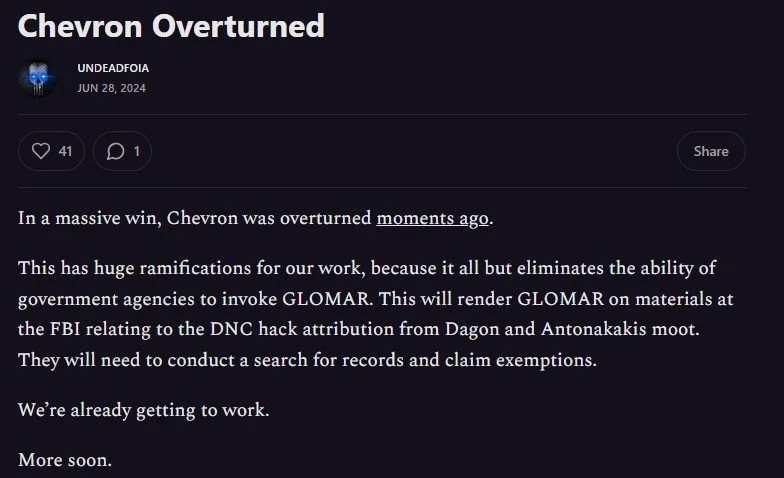On June 28, 2024, the U.S. Supreme Court in Loper Bright Enterprises v. Raimondo overturned its 40-year-old Chevron doctrine, which the Court explained “sometimes required courts to defer to ‘permissible’ agency interpretations of the statutes those agencies administer—even when a reviewing court read the statute differently.”
In a hot take, Ryan Milliron, a FOIA blogger and frequent litigator, asserted that the Court’s decision would preclude federal agencies from issuing Glomar responses, that is, refusing to confirm or deny the existence of records sought under FOIA.
Mr. Milliron, a CPA by trade, is mistaken. FOIA Advisor’s Ryan Mulvey, lead counsel for the Cause of Action Institute team in the Loper Bright case, explains:
Chevron deference was never really relevant—with one possible exception, noted below—to judicial review under the FOIA. To start, the FOIA is clear that courts must adopt a de novo standard of review for all matters related to the withholding of an agency record. Such a standard isn’t expressly true, as a textual matter, for Section 706 of the APA, at least insofar as it pertains to questions of law. Second, and more obviously, no one agency is responsible for administering the FOIA, which applies across the federal government. See, e.g., Tax Analysts v. IRS, 117 F.3d 607, 613 (D.C. Cir. 1997). An agency wouldn’t even be able to get past “Step Zero” of the old Chevron regime. That was even the case with specific provisions that direct OMB to devise and publish uniform (i.e., government-wide) fee guidelines, too. OMB’s definitions simply weren’t entitled to any special deference. See Sack v. DOD, 823 F.3d 687, 692 (D.C. Cir. 2016); see generally Cause of Action v. FTC, 799 F.3d 1108 (D.C. Cir. 2015).
That said, things were always a bit tricky with Exemption 3, which cross-references withholding statutes that exist outside Section 552. As it stands, I believe there’s still a technical circuit split about whether or when deference to agency interpretations of the scope of an Exemption 3 statute are warranted. That split should now ostensibly resolve post-Loper in favor of good, ole’ de novo review across the board. Consequently, as with any question of statutory interpretation, a judge would provide his or her independent, best judgment about the scope of the withholding provision. And application of that statute in any particular FOIA case would (as before) be considered de novo.
As an aside, there are other kinds of ‘deference’ that exist in FOIA land, and which many requesters find troubling, especially given the statute’s promise of de novo review. Courts often afford significant deference to factual determinations set out in agency affidavits. Consider, for example, the language of “substantial weight” in Exemption 1 litigation, or the “good faith” and “regularity” presumptions in all cases. There’s also a radical uniqueness to FOIA and FOIA litigation that ends up giving de facto deference to the government. We might look to the the lack of an administrative record, the rarity of discovery, the multiple rounds of summary judgment so that agencies can get another bite at the apple, etc. Finally, the D.C. Circuit has decided to afford deference to an agency’s interpretation of its own regulations that provide for additional grounds for expedited processing beyond those set out in the statute. See, e.g., Al-Fayed v. CIA, 254 F.3d 300, 307 n.7 (D.C. Cir. 2001). (That, of course, implicates Auer deference, which is still good doctrine, albeit limited by Kisor v. Wilkie.) Loper Bright and the broader movement to reform the administrative state haven’t yet touched these kinds of concerns.
But to return to Mr. Milliron’s assertion, an agency that issues a Glomar response has only ever needed to persuade a reviewing court that acknowledging the existence or non-existence of requested information would constitute information that itself falls within a FOIA exemption. See, e.g., Schaerr v. DOJ, No. 21-5165, No. 2023 WL 3909471 (D.C. Cir. 2023). In evaluating such Glomar claims, as opposed to arguments about the scope of the underlying exemptions, courts were never required by Chevron to defer to agency legal interpretations. The matter was always de novo. Moreover, whatever factual deference might have been given to an agency’s affidavits would not have been required by Chevron. The recent abrogation of Chevron has absolutely no impact on Glomar responses, and it certainly doesn’t foreclose their use.
Congratulations to Mr. Mulvey and his colleagues at Cause of Action Institute, including FOIA Advisor’s Kevin Schmidt, on the landmark Loper Bright ruling.

